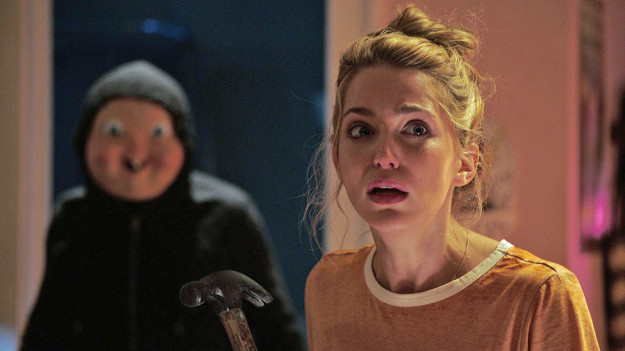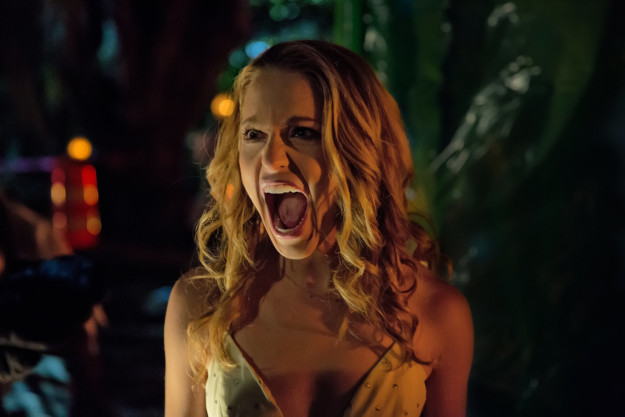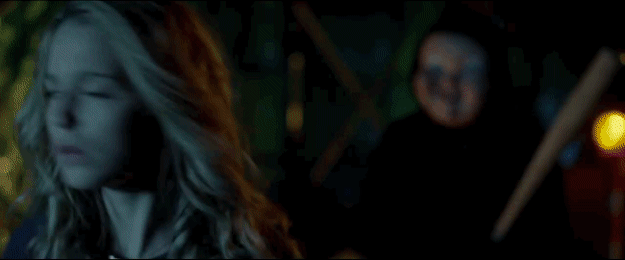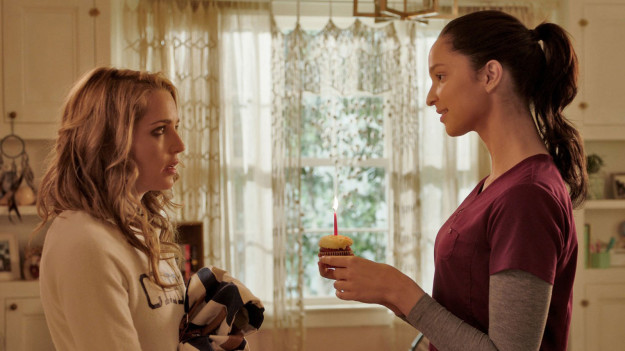

Jessica Rothe as Tree Gelbman in Happy Death Day.
Universal Pictures
Tree Gelbman is not your typical final girl.
Final girls, those young female characters who have so often been the sole survivors of slasher movies, are usually also nice girls — in the sense that they’re both sweet and well-behaved. They’re resourceful and quite possibly plucky, and they don’t drink and they don’t have sex, and their reward for their unfussy wholesomeness is that they’re allowed to survive the story and the climactic showdown with the big baddie.
Tree, the time-looping heroine of Happy Death Day played by Jessica Rothe, is none of these things. She is (as she’d probably cop to herself) a bit of a bitch — a flaky, catty, blonde sorority girl who helps enforce a harsh social hierarchy in which she occupies a prime perch. In a scene the film repeatedly returns to like a save point in a video game, she wakes up in a stranger’s dorm room bed, irritatedly warns the guy (Israel Broussard) “not a word of this to anyone,” and hoofs it, in last night’s outfit, back to her sorority house, where she’s grilled by frenemy Danielle (Rachel Matthews), not about whether she’s okay, but about whether the guy she was with was of appropriate status.

Universal Pictures
Tree parties, she fucks, she’s mean, and she has a habit of wandering into amusingly sinister locations by her vulnerable lonesome, often in a primed-to-get-gore-stained white dress. She’s chosen an unforgivably annoying “it’s your birthday” ringtone for her phone. She is — at least by the rules of the genre so memorably made explicit in Scream and deconstructed in The Cabin in the Woods — doomed. And indeed, she’s murdered by a masked killer in a pedestrian underpass in Happy Death Day‘s first act, the kind of bloody end you might expect for a cheerleader type in this sort of horror film. Only she gets to come back, and to try to find a way to live on for another day.
Happy Death Day, which was directed by Christopher B. Landon and written by Scott Lobdell, is a welcome sign that the teen slasher might be returning to life (sorry) after getting pinned under the weight of the self-awareness that, on the plus side, did give us the meta humor of things like Scream and Cabin in the Woods. It’s a product of Blumhouse Productions, which leveled up this year with Get Out and Split, two legit cultural breakthroughs as well as box office hits; the company also deserves some attention for what it’s done to help resurrect (sorry) this shrieky, silly, and curiously satisfying subgenre for the smartphone generation. Blumhouse is behind, among other titles, 2014’s improbably good desktop found footage feature Unfriended and 2015’s improbably bad (but successful) theater found footage feature The Gallows. Happy Death Day falls somewhere between them quality-wise, eschewing the found footage concept for an equally high Groundhog Day–meets–House on Sorority Row one.

Universal Pictures
The result is something that’s just the right amount of ridiculous, flipping between legit scares and horror comedy. Happy Death Day‘s highlight isn’t a scene of dread, but a demented montage of Tree spying on suspects in order to solve her own murder like some inept, respawning Nancy Drew — only to get hunted down, again and again, by her dogged, baby-faced executioner. But the film doesn’t just find a clever way to refresh a maybe-calcified genre. It also overturns some of the genre’s more puritanical tendencies by focusing on the sort of character whose death would traditionally be presented as an extreme but deserved kind of comeuppance, because surviving these sorts of stories is a reward reserved for the nice, the pure, and — occasionally — the comic relief.
In that way, Happy Death Day represents a kind of reparation on behalf of conventional slasher fodder. Instead of moving on from Tree after she’s snuffed out, the film stays with her as she runs through her fateful birthday again and again, looking for a way out. She isn’t discardable: Her character gets filled out more and more as the day repeats, into a person with tragedy in her family life and a great deal of denial. She’s someone who sought solace in becoming a particular form of campus socialite, remaking herself in the image of the pretty, shallow, demanding sorority queen. In moments of self-reflection, she admits to having become someone she doesn’t think her mother would be proud of.

Rothe and Ruby Modine.
Universal Pictures
Tree isn’t just a type. And neither is the roommate, Lori (Ruby Modine), who’s placed in her immediate proximity for seemingly easy comparison. Lori works at a hospital, doesn’t wear makeup, and kindly gifts Tree with a homemade cupcake that the birthday girl promptly discards (too carb-heavy). Lori, in fact, is the kind of character who, from the outside, has the markers of a standard final girl (she’s even a brunette, in contrast to Tree), and the way that the film frees both her and Tree up from their expected destinies is witty and pointed. Because, really, why keep holding fast to the conservatism of those unspoken requirements for survival in these films, anyway?
Happy Death Day trades the moralism for a more palatable arc of self-improvement, with Tree peeling off the brittle veneer she’s acquired as the movie rolls on, shedding the phony friends and the casual cruelty and reexamining the life she’s made for herself. And though her self-examination — like the movie itself — is highly imperfect (in particular, in how it resolves the affair she’s having with a married professor), her sense of liberation isn’t. Tree doesn’t make it to the end of Happy Death Day because she’s somehow unspoiled or because she learns to clean up her act, but because she frees herself from the highly regimented persona she was using as armor. She’s not good, but maybe she’s better — and that’s the kind of final girl revamp worth rooting for.

